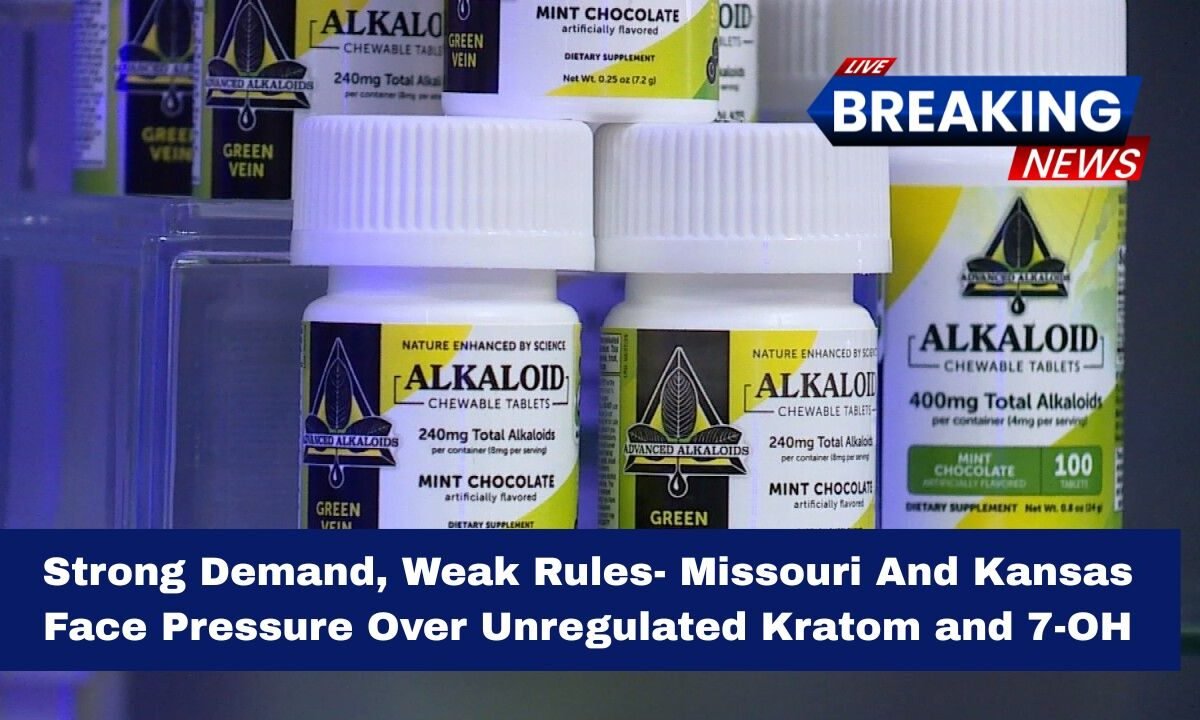Across Missouri and Kansas, demand for kratom and its more potent derivative 7-hydroxymitragynine (7-OH) has surged.
Gas stations, smoke shops, and online vendors now sell a wide range of products, from powdered kratom to concentrated 7-OH shots, gummies, capsules, and vape liquids.
While many adults use kratom for mood enhancement or pain management, the introduction of high-potency 7-OH products has triggered growing public-health concerns.
Both states have struggled to establish cohesive regulation.
Lawmakers, public-health officials, and community leaders warn that the market is expanding faster than existing laws can respond, leaving consumers exposed to products with unpredictable strengths and unclear labeling.
What Makes 7-OH Different?
Although kratom is a natural plant product, 7-OH is a far more powerful compound.
In concentrated forms, it acts on the same receptors as opioids, contributing to risks of dependence, withdrawal, and respiratory depression, especially when combined with alcohol or sedative medications.
Unlike kratom leaf powder, which contains a mix of alkaloids in relatively low concentrations, lab-enhanced or synthesized 7-OH can be dozens of times stronger.
Health officials in the region warn that consumers often cannot distinguish between regular kratom and 7-OH products because packaging frequently uses similar branding.
Missouri and Kansas- A Patchwork of Failed and Stalled Regulation
Both states have attempted, multiple times, to regulate kratom, require age limits, mandate testing, or restrict 7-OH products. However:
- Proposed consumer protection laws have stalled in committee.
- Attempts to regulate 7-OH specifically have failed to pass.
- Several municipalities have considered local bans or restrictions but have not enacted long-term rules.
As a result, both Missouri and Kansas currently have minimal statewide standards, allowing vendors to sell kratom and 7-OH products without consistent oversight.
Public-Health Concerns Growing Across the Region
Hospitals and emergency-response teams in the Midwest report significant increases in calls linked to kratom and 7-OH use.
Common symptoms include rapid heart rate, agitation, confusion, nausea, and in 7-OH cases, symptoms that resemble opioid overdose.
Parents, educators, and medical providers also report more youth exposure, partly because many stores sell flavored gummies, colorful shots, and vape products that resemble energy supplements. In the absence of age restrictions, minors can often purchase these items freely.
Forms of Products Available
Both states now see a wide range of kratom-related products on store shelves:
- Kratom leaf powder
- Kratom capsules
- Kratom tea drinks
- 7-OH shots and “energy boosters”
- 7-OH gummies
- Vape liquids with kratom-derived alkaloids
According to local health-department warnings, many of the high-potency 7-OH products are particularly risky because they contain extremely concentrated doses with limited testing.
Key Facts About Kratom and 7-OH in Missouri and Kansas
| Category | Details |
|---|---|
| Legal status | Kratom legal in both states; no comprehensive statewide regulations for kratom or 7-OH |
| Youth access | No statewide age restrictions; some stores sell to minors |
| Product potency | 7-OH products significantly stronger than traditional kratom |
| Common forms | Powders, capsules, gummies, shots, vape liquids |
| Key concern | Rising emergency-response calls and lack of testing standards |
Why Regulation Hasn’t Caught Up
Several factors have slowed legislative action:
- Disagreement over whether kratom should be regulated, restricted, or protected.
- Advocacy groups arguing that kratom is a natural supplement.
- Lack of federal uniform policy.
- Rapid introduction of new, stronger products like synthetic or enhanced 7-OH.
Lawmakers are now under pressure to revisit legislation as the marketplace grows more complex and public-health incidents continue to climb.
Missouri and Kansas stand at a critical moment.
As demand for kratom and particularly 7-OH increases, both states face mounting public-health challenges tied to potency, youth access, and inconsistent labeling.
Without strong regulatory standards—such as testing requirements, age restrictions, and clearer product definitions—consumers remain vulnerable in a rapidly expanding, largely unmonitored market.
Clear, uniform rules will be essential for protecting public health while ensuring that adult consumers have access to safe, accurately labeled products.




